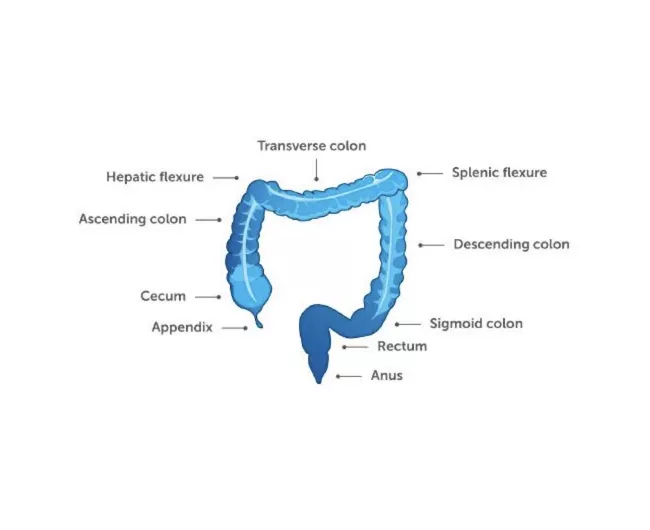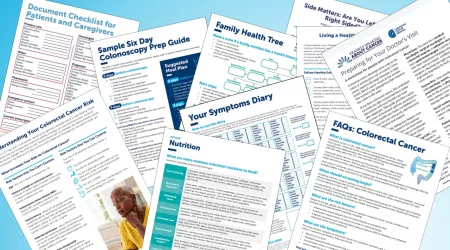
What is colorectal cancer?
Colorectal cancer is a cancer that starts in the colon or rectum, which are parts of the digestive system. Unlike most cancers, colorectal cancer is often preventable with screening and highly treatable when detected early.

Colorectal cancer by the numbers
Colorectal cancer is the fourth most common cancer in the U.S. among men and women combined.
Each year, about 150,000 Americans are diagnosed with colorectal cancer.
With early detection, colorectal cancer has a 90% survival rate.
Common symptoms of colorectal cancer
Colorectal cancer often develops without symptoms. When they occur, they may include the following.
Rectal bleeding
Blood in or on your stool is a symptom of rectal cancer and colon cancer. The blood can be bright red, or the stool may be black and tarry or brick red.
Changing bowel habits
Changing bowel habits may include intermittent or constant diarrhea and/or constipation, a change in the consistency of your stool, or stools that are more narrow than usual.
Persistent abdominal discomfort
Abdominal discomfort may present as cramps, gas, or pain. You may also feel full, bloated, or like your bowel is not completely empty. Nausea and vomiting can also be symptoms.
Unexplained weight loss
A loss of weight for no known reason should always be investigated. Nausea and/or vomiting are also possible symptoms.

What is the difference between colon and rectal cancer?
Colon cancer and rectal cancer are often grouped together because they have a lot in common—including symptoms—but they are different, depending on where they originate.
Stages of colorectal cancer
Staging is the process doctors use to find out if cancer has spread within the colon/rectum or to other parts of the body. Staging is important because it helps determine the best treatment plan.
Polyp growth
Colorectal cancer often begins with a polyp, an abnormal growth of tissue inside the colon or the rectum. Not all polyps are cancerous, but there is no way to tell which ones will develop into cancer. It's always best to remove polyps to prevent cancer from developing.
Stage 0
Colon cancer: This is the earliest stage. Cancer has not moved from where it started—it's still restricted to the innermost lining of the colon.
Rectal cancer: Abnormal cells are found in the innermost lining of the rectum. These abnormal cells may become cancer and spread into nearby normal tissue.
Stage I
Colon cancer: Cancer is still in the inner lining but has grown through the mucosa of the colon and invaded the muscle layer.
Rectal cancer: Cancer has formed and spread beyond the innermost lining of the rectum to the second and third layers and involves the inside wall of the rectum, but it has not spread to the outer wall of the rectum or outside the rectum.
Stage II
Colon cancer: Cancer has spread through the colon wall but has not spread to the regional lymph nodes.
Rectal cancer: Cancer has spread outside the rectum to nearby tissue, but it has not gone into the lymph nodes.
Stage III
Colon cancer: The cancer has spread to the lymph nodes near the colon, but it has not spread further.
Rectal cancer: Cancer has spread to nearby lymph nodes, but it has not spread to other parts of the body.
Stage IV
Colon cancer: The cancer has spread outside of the colon and has been carried through the lymph and blood systems to distant parts of the body. This is known as metastasis. The most likely organs to develop metastasis from colorectal cancer are the lungs and liver.
Rectal cancer: Cancer has spread to other parts of the body, such as the liver, lungs, or ovaries.

Health equity in colorectal cancer
Colorectal cancer impacts some demographics more than others. For instance, Black Americans face significantly higher death rates from colorectal cancer than white Americans. Other disparities exist that must be addressed to end colorectal cancer for everyone.
Colorectal cancer is beatable with early detection
Screening is the #1 way you can prevent colon cancer and rectal cancer. They're also highly treatable if caught early. That’s why on-time screening is essential and lifesaving.
Top resources

Legislation introduced to address young-onset CRC
Explore the urgent need for the Colorectal Cancer Early Detection Act (HR 7714), legislation aimed at combating the rising incidence of colorectal cancer among younger adults through enhanced screening, education, and research.

Christy Williams: Biomarker testing leads to successful treatment
Statistics suggested that Christy’s odds of survival were grim, so she leaned into her faith and kept a positive outlook. She tried to control what she could. And, critically, she received biomarker testing.

Colorectal cancer resources for learning and sharing
Whether personally impacted by colorectal cancer (CRC), supporting a loved one, or dedicated to educating and empowering others, these downloadable and printable resources can help.





